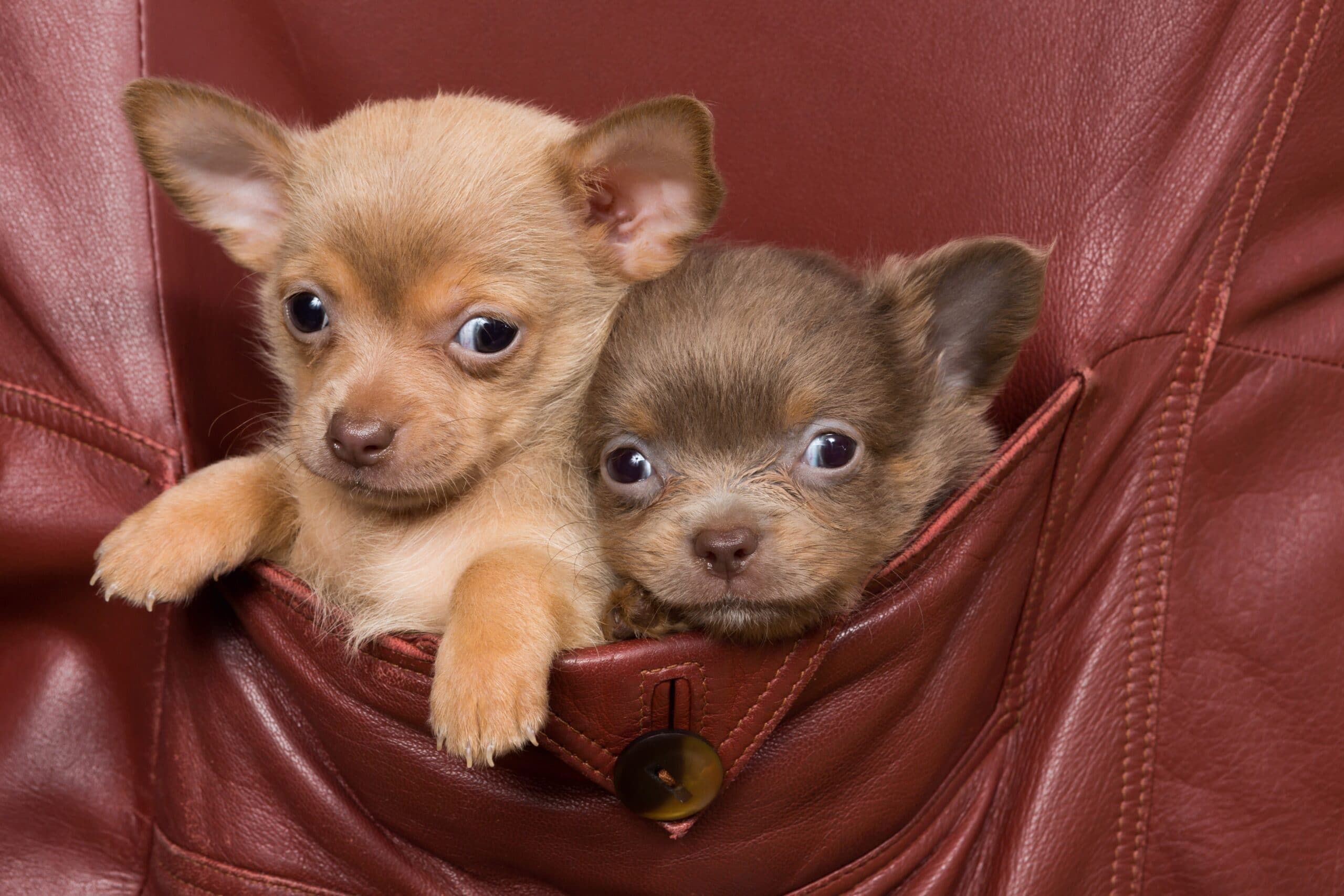Pocket puppies: 12 breeds that are too adorable for words
If you want a dog that doesn’t take much room, look for pocket puppies, which are tiny dog breeds.
Pocket puppies are usually half the size of larger toy dog breeds.
A pocket puppy reaches a maximum adult weight of five pounds or less.
Pocket puppies are designer breeds created by breeding two tiny dogs weighing less than 5 pounds.
Controversial breeding practices
Several issues surround pocket puppies, ranging from breeding practices of unscrupulous breeders to health concerns.
The health of the mother is often put at risk while breeding pocket puppies.
Small breeds already have poor pregnancy health, which is made worse by many births.
Breeding typically involves a mother dog who has previously delivered pocket puppies. As a result, the dog and puppies face a lot of stress.
Unscrupulous breeders sometimes breed dogs from the same litter to ensure a ready stock of small puppies.
To make matters worse, some breeders intentionally starve the puppies to limit their growth.
If you’re looking for a pocket puppy, be sure to find a responsible breeder whose litter is from a first pregnancy and shows no sign of being underfed.
Below are few things you can do to make sure the breeder is reliable.
- Make sure to visit the breeding facility.
- Take a look at the mother and father dogs.
- Ask a lot of questions about the history of the pups and the breeders.
- Ask for copies of the vet records for both parents and the puppies.
- Call other clients that have adopted puppies from the same breeder and ask if they would recommend him.
Health Issues
Health problems common to pocket puppies include:
- Hypoglycemia: In pocket puppies, low blood sugar is the most common health issue.
- Small frame: Due to their small structures, they have a higher risk of diseases.
- Respiratory diseases: They can be affected by respiratory, heart, and brain diseases.
- Vet visits: Prospective owners need to remember that having a pocket puppy can mean frequent vet visits due to potential health issues.
Consider getting a regular-sized dog breed if you don’t have the time or the financial means to maintain a pocket puppy.
Easily harmed

- Falling objects: Pocket puppies are vulnerable to injury from falling objects or walking feet.
- Warn visitors: Remind guests to be on the lookout for your pup when they’re strolling through your home.
- The danger of falling: Keep your pocket puppy out of places where they could be at risk of falling.
- Risk of dogs attacking: When walking your pocket puppy or taking him to a dog park, be conscious of the possibility of dogs attacking him. Pocket puppies are easily injured by other dogs, especially if they are aggressive.
- Protect against harsh weather: Also, protect them from severe weather and hazardous sports.
- Be wary of children: As with all small breeds, keep pocket puppies away from children. A pocket puppy can be injured by rough handling or falling from heights because of its small size. Even if your child is good with animals, they should always be supervised around a pocket puppy because one of the common issues is easily broken bones.
- Cannot go out alone: A pocket puppy cannot go outside alone because they are easy prey for owls, hawks, and other “predators.”
A pocket puppy is precious, and you need to treat them with special care and give them extra attention.
Pocket puppies are not suitable for everyone
Pocket puppies may not be the right pet for everyone. Their requirements are different when it comes to feeding, care and even training.
Feeding
- Pocket puppies have teeny-tiny stomachs and bladders.
- They can’t be as healthy as larger breeds if you feed them a couple of times a day.
- These tiny dogs require 4-5 small meals each day and should be allowed outside for pee breaks every hour.
Housebreaking
- Pocket puppy breeds are notoriously challenging to housebreak.
- House training using high-quality puppy pee pads may be the best option.
It necessitates a great deal of attention
- Pocket puppies are not suitable for all owners.
- You shouldn’t opt for a pocket puppy if you are unable to provide the care it requires.
- Pocket puppies can be high maintenance for you unless you work from home or a dog-friendly firm.
Pocket puppy breeds: Frequently Asked Questions
Make sure you’re well-informed before committing to one of the pocket puppy breeds. The following questions will help you to have a good idea of what you are getting into.
What is a pocket puppy’s typical lifespan?
Small dogs, on average, live longer than their larger counterparts, with the shortest surviving varieties still outliving most large breeds. As a result, pocket puppies are a good alternative for people looking for long-term companions.
What is the price of a pocket puppy?
If you want a pocket puppy, invest extra money and buy one from a reputable breeder or adopt from a shelter.
If you’ve done your homework and still think one of the pocket puppy breeds is perfect for you, it’s time to pick the one that will best suit your needs.
What is the maximum size of a pocket puppy?
Why are pocket puppies bad?
The following are a few of the famous pocket puppy breeds:
1. Micro Pomeranian

Micro Pomeranians are a breed of Pomeranian dog that is smaller than the standard Pomeranian.
Pomeranians are among the popular breeds of dogs in the United States.
They are both intelligent and friendly.
They are small in stature, but they have a strong presence.
This lovable breed of pocket puppy comes in various colors, but the most frequent are red and orange, or a combination of these hues.
These puppies are incredibly gentle with children.
Their charming, friendly temperament makes them an ideal pet.
As they are small in size, you may carry them in your handbag or backpack.
Micro Pomeranians require very little activity, and a short walk is sufficient to meet their needs.
2. Micro Chihuahua

The Chihuahua is already one of the world’s tiniest dog breeds, but the micro is even smaller, fitting into the palm of your hand.
Micro Chihuahuas weigh no more than four pounds, compared to six pounds for a regular Chihuahua.
Chihuahuas, in general, are known for being bossy and assertive, and this breed is no exception.
For their tiny size, these pups have a surprisingly powerful voice! They may not be suitable for an apartment as the loud barks can upset your next-door neighbors.
A tiny Chihuahua has a nervous temperament and gets easily upset, so it is not suitable for a family with children.
They also don’t get along with dogs that are larger than them. It’s preferable if you keep it as the only pet in the house.
This dog would thrive in a household made up of singles or newlywed couples.






